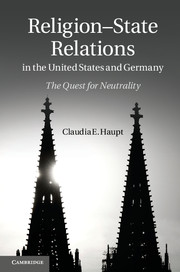7 - Delineating neutrality
from Part II - Religion–State Relations and the Role of Neutrality
Published online by Cambridge University Press: 05 January 2012
Summary
The development outlined thus far leaves us with one final task: the search for the meaning of state neutrality. But, as many have noted before me, neutrality is an elusive concept. Different, at times even competing, ideas of religion–state relations bear the neutrality label. In light of the previously examined circumstances, how can neutrality be best approximated in comparative perspective? Several common themes are discussed in the United States and Germany, and this chapter addresses them in turn. Elucidating these themes in comparative perspective can advance our understanding of the substantive content, and possible utility, of the concept of state neutrality in the constitutional law of religion–state relations.
First, various concepts of neutrality can be identified. In the scholarship of both countries, a generally positive and a generally (comparatively more) negative alternative of neutrality are discussed. These headings already indicate that sometimes, scholarship in the two countries uses the same or similar terminology to describe different legal phenomena; sometimes it discusses parallel substantive issues under the same, sometimes under different, headings. In light of the discussion of comparative constitutional law in Chapter 1, this should not be surprising. The inquiry into the meaning of neutrality that follows shows how similar the application is despite the differences in the underlying constitutional framework.
- Type
- Chapter
- Information
- Religion-State Relations in the United States and GermanyThe Quest for Neutrality, pp. 167 - 201Publisher: Cambridge University PressPrint publication year: 2011



